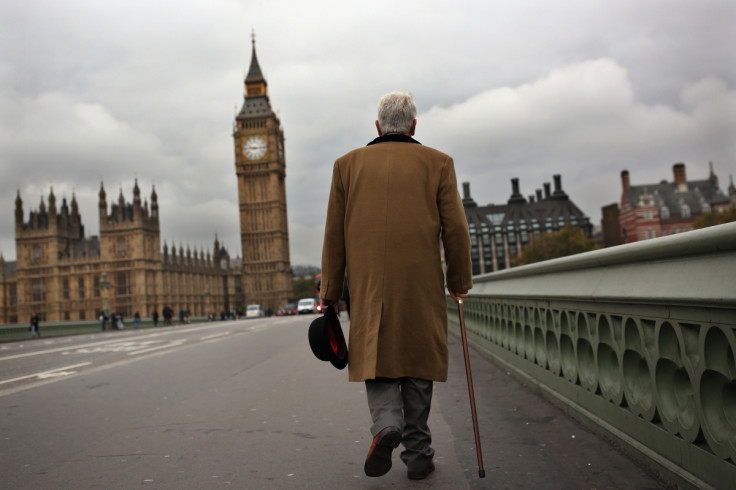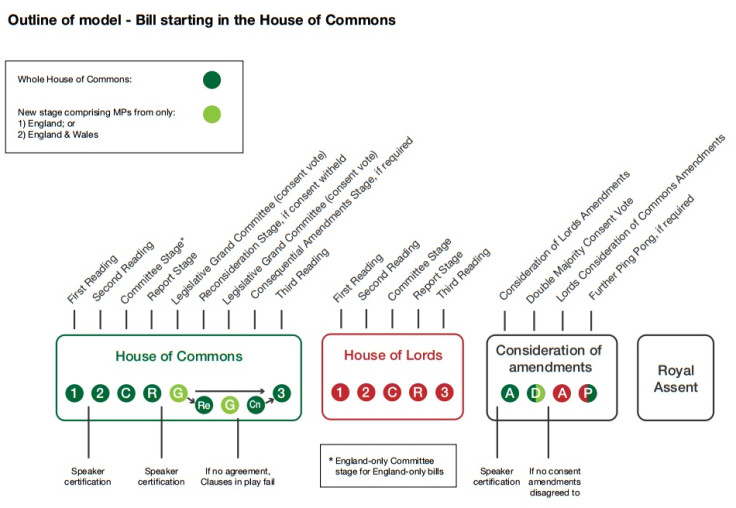English votes for English laws: The controversial EVEL changes explained

Britain's parliament is debating one of the most significant constitutional changes in its history, and one that may finally answer the "West Lothian question". It a House of Commons debate on a rule that will, if passed, introduce for the first time English votes for English laws, or EVEL for short.
The West Lothian question refers to the issue of Scottish and Northern Irish MPs, and to some extent Welsh MPs, voting on laws that will only affect England. One example would be Scottish MPs voting on English higher education laws, because higher education is a devolved policy area over which the Scottish Parliament has control within its own borders.
A debate about the West Lothian question kicked off the day after the result of the Scottish independence referendum, when Scots backed staying in the UK by 55% to 45%. To secure the win, Prime Minister David Cameron promised much more devolution of power from Westminster to the Scottish Parliament -- which only loudened the cry of the West Lothian question. So now it is being addressed.
The proposals going through the House of Commons, in the form of a standing order, are quite arcane and procedural, but they are essentially this: the speaker of the house will certify whether or not a law exclusively applies to England or England and Wales (which does not have as much devolved power as Scotland and Northern Ireland); if a law is certified as English or English and Welsh-exclusive, then as it makes its way through Parliament, only English and Welsh MPs will be given the chance to consent to or veto it. And when the bill reaches select committees for scrutiny, only English or Welsh MPs will sit on them.
Standing orders are written rules under which Parliament conducts its business. They regulate the way members behave, bills are processed and debates are organised. Some standing orders are temporary and only last until the end of a session or a parliament. There are around 150 standing orders relating to parliamentary business and public bills, and about 250 relating to private business.
Source: UK Parliament
This consent or veto will be made by only English MPs, and Welsh MPs if the matter affects Wales too, who will form what is called a "Legislative Grand Committee". It will work as a filtration system. While the whole house can debate and vote on bills, or table amendments, they can only progress with the express consent and agreement of the Legislative Grand Committee. Any amendments that are not approved by the committee will be removed.
After passing through the House of Lords, a bill returns to the Commons for final approval, including Lords amendments, before being given Royal Assent and formally passed into law.
"If the bill is amended by the House of Lords, then, when it returns to the Commons, the speaker is required to certify any motions relating to Lords amendments to the bill on the same basis as before," says a government briefing document on EVEL. "Any votes on amendments that have been certified as England- or England-and-Wales-only will be subject to a double majority vote. That is to say that such amendments will have to be supported by a majority of English or English and Welsh MPs, as well as a majority of all MPs, before they can become law."

Proponents of the EVEL changes argue that it is fair to English voters because their MPs are not allowed to vote in the devolved legislatures of Scotland, Northern Ireland and Wales, but MPs from those nations can vote in the Commons on matters that will only affect England. It follows the path of devolution over the years, only from an English perspective.
"English MPs are entirely excluded from any discussion of Scottish health or Scottish housing or Scottish education," said Cameron in July 2015. "What this is going to introduce, as it were, is a system for making sure that the wishes of English MPs cannot be overruled."
He added: "I think that's only fair in system when the Scottish Parliament and the Welsh Parliament and the Northern Ireland Parliament have increased powers."
However, critics of the EVEL proposals say they risk turning the Commons -- the seat of power for the whole of the UK -- into a proxy for English rule by doubling the votes of the nation's MPs. And they fear that non-English MPs will be barred from voting on matters that relate to their own nations because the certification process for bills and amendments is arbitrary, and often bills will have indirect consequences for the other nations. The EVEL plans also threaten to change how UK governments can function, by weakening or strengthening their majorities from bill to bill.
© Copyright IBTimes 2025. All rights reserved.






















